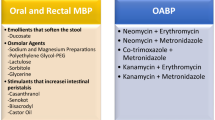Abstract
Objective
To investigate the effect of postoperative prune consumption on time to first bowel movement after benign gynecologic surgery.
Materials and methods
In this randomized, open label, controlled trial, 77 adult women who had benign gynecologic surgery that required at least one night in the hospital were enrolled from July 2018 to April 2019. Participants were randomized in a 1:1 ratio to one of two groups using a randomization assignment: 4 oz prunes daily plus docusate sodium 100 g twice daily versus docusate alone. The study’s primary objective was time to first bowel movement (BM). Secondary outcomes were pain associated with first BM, stool consistency using Bristol stool scale, and patient satisfaction with bowel regimen and surgery experience.
Results
Postoperative survey data was available for 68.4% of participants (n = 52). There was no difference in time to first BM between the two groups (p = 0.29); however, consumption of > 12 prunes was associated with an increased likelihood of having a BM in the study period. Among women who consumed at least 12 prunes, hospital discharge was earlier, and there was a not statistically significant greater satisfaction with postoperative bowel regimen.
Conclusions
The addition of prunes to postoperative bowel regimen of docusate sodium may be a beneficial adjunct to postoperative bowel regimen.
Clinical trial
The Institutional Review Board at the University of Southern California approved the study, and the study was registered at clinicaltrials.gov (ID: NCT03523715).



Similar content being viewed by others
References
Caljouw MA, Hogendorf-Burgers MEHJ (2010) GYNOTEL: telephone advice to gynaecological surgical patients after discharge. J Clin Nurs 19(23–24):3301–3306
Iwanoff C, Giannopoulos M, Salamon C (2019) Follow-up postoperative calls to reduce common postoperative complaints among urogynecology patients. Int Urogynecol J 30(10):1667–1672
Holte K, Kehlet H (2000) Postoperative ileus: a preventable event. Br J Surg 87:1480–1493
Asgeirsson T, El-Badawi KI, Mahmood A, Barletta J, Luchtefeld M, Senagore AJ (2010) Postoperative Ileus: It Costs More Than You Expect. J Am Coll Surg 210(2):228–231
Müller-Lissner SA, Kaatz V, Brandt W, Keller J, Layer P (2005) The perceived effect of various foods and bevereges on stool consistency. Eur J Gastroenterol Hepatol 17(1):109–112
Attaluri A, Donahoe R, Valestin J, Brown K, Rao SSC (2011) Randomised clinical trial: dried plums (prunes) vs. psyllium for constipation. Aliment Pharmacol Ther 33(7):822–8
Lever E, Cole J, Emery P, Whelan K (2012) The effect of prunes on gastrointestinal health – a systematic review of randomised controlled trials. Proc Nutr Soc 71(OCE3):71
Stacewicz-Sapuntzakis M, Bowen PE, Hussain EA, Damayanti-Wood BI, Farnsworth NR (2001) Chemical composition and potential health effects of prunes: a functional food? Crit Rev Food Sci Nutr 41(4):251–286
Yao CK, Tan H-L, van Langenberg DR, Barrett JS, Rose R, Liels K et al (2014) Dietary sorbitol and mannitol: food content and distinct absorption patterns between healthy individuals and patients with irritable bowel syndrome. J Hum Nutr Diet 27(SUPPL2):263–275
Harris PA, Taylor R, Thielke R, Payne J, Gonzalez N, Conde JG (2009) Research electronic data capture (REDCap)-A metadata-driven methodology and workflow process for providing translational research informatics support. J Biomed Inform 42(2):377–381
Lewis SJ, Heaton KW (1997) Stool form scale as a useful guide to intestinal transit time. Scand J Gastroenterol 32(9):920–924
McNanley A, Perevich M, Glantz C, Duecy EE, Flynn MK, Buchsbaum G (2012) Bowel function after minimally invasive urogynecologic surgery: a prospective randomized controlled trial. Female Pelvic Med Reconstr Surg 18(2):82–85
Schulz KF, Altman DG, Moher D (2010) CONSORT 2010 statement: updated guidelines for reporting parallel group randomised trials. BMC Med 8(1):18
Berger NG, Ridolfi TJ, Ludwig KA (2015) Delayed gastrointestinal recovery after abdominal operation - role of alvimopan. Clin Exp Gastroenterol 8:231–235
Siegel JD, Di Palma JA (2005) Medical treatment of constipation. Clin Colon Rectal Surg 18(2):76–80
Patel M, Schimpf MO, O’Sullivan DM, LaSala CA (2010) The use of senna with docusate for postoperative constipation after pelvic reconstructive surgery: a randomized, double-blind, placebo-controlled trial. Am J Obstet Gynecol 202(5):479.e1-479.e5
Edenfield AL, Siddiqui NY, Wu JM, Dieter AA, Garrett MA, Visco AG (2016) Polyethylene glycol 3350 and docusate sodium compared with docusate sodium alone after urogynecologic surgery: a randomized controlled trial. Obstet Gynecol 128(3):543–549
Author information
Authors and Affiliations
Contributions
MA Rasouli: project development, data collection, manuscript writing.
CE Dancz: project development, data collection, manuscript writing.
M Dahl: data collection, manuscript editing.
KA Volpe: data collection, manuscript editing.
CJ Horton: data collection, manuscript editing.
BZ Ozel: project development, data collection, manuscript writing.
Corresponding author
Ethics declarations
Ethical approval
All procedures performed in studies involving human participants were in accordance with the ethical standards of the institutional and/or national research committee and with the 1964 Helsinki declaration and its later amendments or comparable ethical standards.
Informed consent
Informed consent was obtained from all individual participants included in the study.
Consent for publication
Yes.
Competing interests
The authors declare no competing interests.
Additional information
Publisher's note
Springer Nature remains neutral with regard to jurisdictional claims in published maps and institutional affiliations.
Rights and permissions
About this article
Cite this article
Rasouli, M.A., Dancz, C.E., Dahl, M. et al. Effect of prunes on gastrointestinal function after benign gynecological surgery: a randomized control trial. Langenbecks Arch Surg 407, 3803–3810 (2022). https://doi.org/10.1007/s00423-022-02584-8
Received:
Accepted:
Published:
Issue Date:
DOI: https://doi.org/10.1007/s00423-022-02584-8




